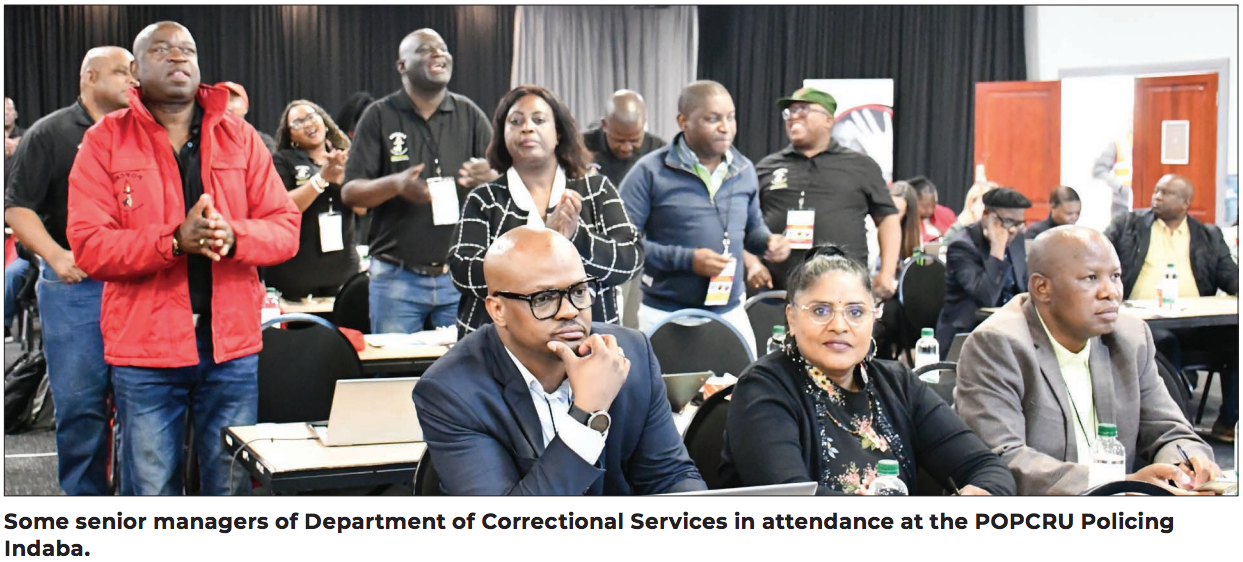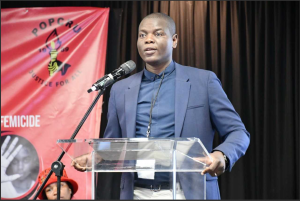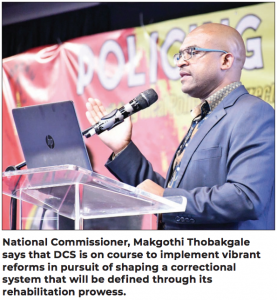
 The Minister of Justice and Correctional Services, Ronald Lamola and National Commissioner for the Department of Correctional Services (DCS), Makgothi Thobakgale used their addresses at the POPCRU Policing Indaba to make substantial submissions on a number of policy and strategic interventions embarked upon to realise an ideal corrections system in South Africa.
The Minister of Justice and Correctional Services, Ronald Lamola and National Commissioner for the Department of Correctional Services (DCS), Makgothi Thobakgale used their addresses at the POPCRU Policing Indaba to make substantial submissions on a number of policy and strategic interventions embarked upon to realise an ideal corrections system in South Africa.
The 3-day Policing Indaba that took place at Birchwood
Hotel & OR Tambo Conference Centre in Boksburg, Gauteng from 23 to 25 August 2023, brought together key role players from the criminal justice system, academia, civil society and industry experts, to reflect on the efficacy of South Africa’s criminal justice systems, with a view to solicit inputs and suggestions that can be adopted to combat and fight against in the society.
Held under the theme: “Building Ideal Policing & Corrections for the 21st Century”, the Indaba sought to make an evidence-based and objective assessment on the fight against crime and to make submissions informed by research and prevailing realities, on policy and strategic interventions that can be implemented to assert the authority of the state and enhance its capacity to fight crime in its different manifestations.
 The use of technology to enhance the fight against crime took centre stage on day-2 of the Indaba, with Minister Lamola strongly advocating for collaborations with research and higher institution to develop technological solutions to fight crime. “We must also enter into collaborations with institutions of research and higher learning to leverage on their technological advances to transform our operations for the better. We also need to re-engineer the criminal justice to match the level of modernisation and digitisation in society today, he said.
The use of technology to enhance the fight against crime took centre stage on day-2 of the Indaba, with Minister Lamola strongly advocating for collaborations with research and higher institution to develop technological solutions to fight crime. “We must also enter into collaborations with institutions of research and higher learning to leverage on their technological advances to transform our operations for the better. We also need to re-engineer the criminal justice to match the level of modernisation and digitisation in society today, he said.
Chief Deputy Commissioner: GITO Evans Maponya, and other senior government technocrats from South African Police Service (SAPS) and the Private Security Industry Regulatory Authority (PSiRA) also weighed in on a variety of technological solutions they are exploring and utilising to combat and prevent crime in line with their legislative mandates.
Minister Lamola announced that work has begun, through the South African Law Reform Commission, to rationalise the law of criminal procedure, as part of a broader project on the review of the criminal justice system. He said this process is intended to cure anomalies and outdated sections of the Criminal Procedure Act 51 of 1977 and regulations and rules made under the Act, including but not limited to the following:
• Bail reform generally;
• Reform of the arrest dispensation, including remove confusion on the interpretation of the 48-hour rule and alternative means of ensuring the attendance of accused persons before court to be charged or tried;
• Reform of parole laws and ensure uniformity with other laws;
• Reform in the expungement of criminal records;
• Reform and uniformity in sentencing provisions;
• Reform of laws of general importance so as to simplify them and to remove anomalies, ambiguities and inequities;
• Review and alignment of the Justice of Peace dispensation; and
• Review and reform of laws relating to the JCPS Cluster.
Notwithstanding the above, Minister Lamola reiterated that as the government of the day, those vested with state power have the responsibility to exercise that power within the bounds of the law, to mount a spirited onslaught on crime.
He also reported that the department is forging ahead with the implementation of the Self-Sufficiency and Sustainability Framework (SSSF), adding that this is a legacy-defining policy intervention for the 6th administration.
“Through our innovation and implementation of the SSSF, South Africans are now talking about inmates and officials who build houses for victims of crime, renovate and upgrade schools, create vegetable gardens for poor schools, and develop sporting facilities in rural areas. We have also made remarkable progress through self-sufficiency where we internally produce food for inmates’ rations, resulting in savings of millions of Rands to the fiscus,” Minister Lamola explained.
 Commissioner Thobakgale gave progress on a plethora of interventions that the Department is implementing on a number of key operational areas such as the type of skillset required to execute the mandate effectively, reengineering of the parole system, addressing the perennial challenge of reoffending, change in offender profiles, implementation of transformation in the criminal justice system which will have an inevitable snowballing effect on the management of overcrowding in Correctional Facilities, and review of rehabilitation programmes.
Commissioner Thobakgale gave progress on a plethora of interventions that the Department is implementing on a number of key operational areas such as the type of skillset required to execute the mandate effectively, reengineering of the parole system, addressing the perennial challenge of reoffending, change in offender profiles, implementation of transformation in the criminal justice system which will have an inevitable snowballing effect on the management of overcrowding in Correctional Facilities, and review of rehabilitation programmes.
“Today’s corrections environment is increasingly focusing on rehabilitation, social reintegration of offenders and restorative justice. And we have pushed ourselves hard not just to adjust to emerging trends, but to take a leadership responsibility in driving a paradigm shift,” said Commissioner Thobakgale.
He said the Indaba has presented DCS with a wider pool of empirical work by academics and specialists in various fields, adding that the information and knowledge will be useful in building a potent criminal justice system.
